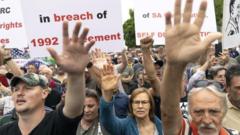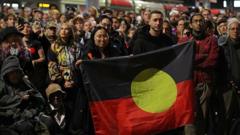A recent court ruling in South Africa has labeled claims of a so-called white genocide in the country as "clearly imagined." The court addressed assertions that sparked heated debates, especially from figures like Donald Trump and Elon Musk, while blocking a hefty donation intended for a white supremacist faction.
South African Court Dismisses 'White Genocide' Claims as Fantastical

South African Court Dismisses 'White Genocide' Claims as Fantastical
Court ruling denies accusations of systemic targeting of white people, rejecting funding to extremist group.
In a significant decision that highlighted ongoing tensions within South Africa, a court has unequivocally rejected the notion of a "white genocide," calling such claims "not real." The ruling coincides with heightened discourse from proponents including former President Donald Trump, who has echoed fears of widespread violence against the white minority, and tech mogul Elon Musk, who has criticized South African policies regarding land ownership.
The case arose surrounding a millionaire's bequest to a white supremacist group, Boerelegioen, where Grantland Michael Bray sought to leave behind $2.1 million to aid their agenda of racial division. However, the court determined that Bray's request was ambiguous and contrary to public policy, invalidating the donation. Reports indicated Bray developed a fixation on an impending genocide of whites in South Africa, especially towards the end of his life before passing away in 2022.
His siblings contested the will, claiming Bray's obsession with the concept was fueled by racist ideologies and misleading online content. The court spotlighted the vagueness of Bray's intended beneficiaries, indicating confusion over the right Boerelegioen entity meant to receive the funds. Judge Rosheni Allie asserted that Bray's intention appeared grounded in unfounded fears rather than reality, emphasizing the organization's basis of support for racial hatred.
Despite claims of a severe threat to the white population, statistical crime data reveal a different narrative. While detailed crime statistics are scarce, recent figures indicated that between October and December 2024, there were 6,953 murders in South Africa, of which a mere 12 were attributed to farm attacks, contradicting extremist claims of targeted violence against white individuals.
The court's ruling against the funding of the extremist group, alongside Trump's recent executive measures freezing financial aid over land seizure laws, underscores the ongoing complexities surrounding race relations in South Africa and the misperceptions propagated abroad.
The case arose surrounding a millionaire's bequest to a white supremacist group, Boerelegioen, where Grantland Michael Bray sought to leave behind $2.1 million to aid their agenda of racial division. However, the court determined that Bray's request was ambiguous and contrary to public policy, invalidating the donation. Reports indicated Bray developed a fixation on an impending genocide of whites in South Africa, especially towards the end of his life before passing away in 2022.
His siblings contested the will, claiming Bray's obsession with the concept was fueled by racist ideologies and misleading online content. The court spotlighted the vagueness of Bray's intended beneficiaries, indicating confusion over the right Boerelegioen entity meant to receive the funds. Judge Rosheni Allie asserted that Bray's intention appeared grounded in unfounded fears rather than reality, emphasizing the organization's basis of support for racial hatred.
Despite claims of a severe threat to the white population, statistical crime data reveal a different narrative. While detailed crime statistics are scarce, recent figures indicated that between October and December 2024, there were 6,953 murders in South Africa, of which a mere 12 were attributed to farm attacks, contradicting extremist claims of targeted violence against white individuals.
The court's ruling against the funding of the extremist group, alongside Trump's recent executive measures freezing financial aid over land seizure laws, underscores the ongoing complexities surrounding race relations in South Africa and the misperceptions propagated abroad.




















